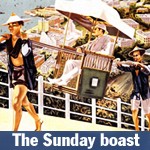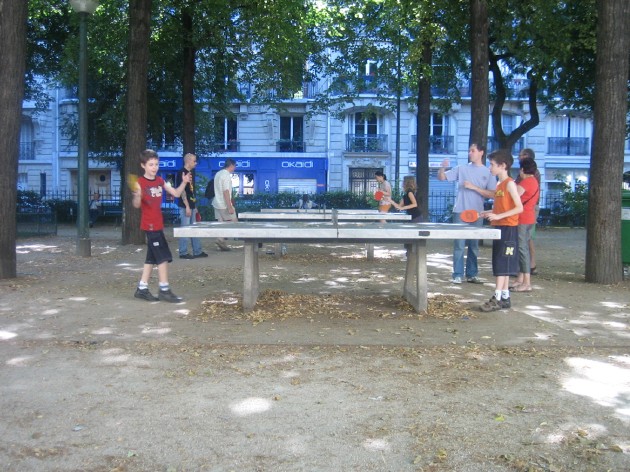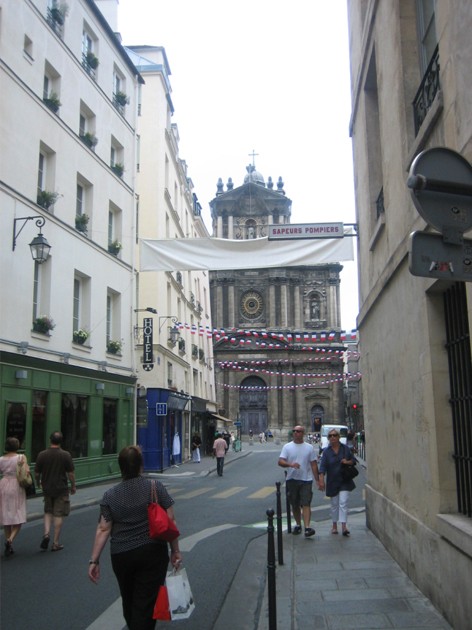 Emma Koehn writes: I wanted fancy pastries from Paris, but I got table tennis instead.
Emma Koehn writes: I wanted fancy pastries from Paris, but I got table tennis instead.
This fact hit home as I sat marooned by luggage in an eastern Parisian playground, waiting for day three of a by-now routine session of ping pong spectatorship.
The French might not acknowledge it, but they sure love alternative sports.

My travel partner and I first noticed them in the park across from our devilishly hot hostel — fifteen neat ping pong tables, lined up slabs of concrete that were waiting for opponents. In the early morning light, they were more like hallowed monuments. Curious. Were people really into such a sport?
Turns out: yes. At 8am each morning, we’d escape our sleazy hostel owner and take an obnoxiously large map and black coffee to the park across the street, waiting for ping pong competitors to flow in.
People had rolled their eyes as I told them of plans to “summer in France”. There isn’t anything original in Le Paris, they bemoaned. I beg to differ. I might not be sporty, but the city’s affection for games is more memorable that any museum tour.
Older men with cigars and hats were always the first to show up for a match, bringing coffee and French philosophy. Families in matching Nike get-ups were next, practising serves with spin. Then the most competitive of them all: young couples, well dressed, with sleek balls and bats, a passive aggressive glint in their eyes.

I didn’t know that love and ping pong were so synonymous until I saw them bring out the best and worst of French youth. Rallies of 20 shots or more before one player got distracted, gave in. On odd numbered games, a couple would change ends, kissing on each cheek and giving a respectable but competitive bow to their loved one. Around ten o’clock, they’d wrap up the game and go to collect the morning paper.
The simple pleasure of it, the competition, the expectation that people would use a park instead of littering it with remnants of a big night out… it was that moment when I quietly asked “why doesn’t my city do this?” Paris and I were connecting in a way I never thought we would.
For all the talk of uptight Parisians, they are quite at ease with using their streets for sport and play and I don’t just mean the random kingdom of ping pong in the aforementioned park. It has siblings, similar spaces scattered around the city. Some parks indulge ping pong enthusiasts; others are swarmed by gymnasts and Parkour artists.
On Friday nights opposite the Opera House, Parisians rewind to the 1980s with hoards rollerblade in the shadow of the Place de la Bastille. They have no real direction and only narrow lanes, but circle up and down the Seine. This is affectionately known as a Roller Parade.
I first experienced a Roller Parade a few days after my ping pong initiation. On a Friday evening, families started swarming from Metro underpasses with their blades tucked neatly under arms. Spectators sat lazily on curbs and in cafes as skaters moved along.
Cooler teens tried their hands at tricks and I sat on a bluestone ledge and watched in fascinated horror. How were they not crashing — and more importantly, did my travel insurance cover roller-conga-line related injuries? Where could I hire blades?

It’s not really the skating itself, more the oddly genteel use of space. People glide almost invincibly next to one of the busiest round-abouts in the world. In my home city, signs often tell people to keep off the street furniture, and law enforcement officers have no patience for mass rollerblading of any kind.
The streets around Place de la Bastille aren’t sleek or modern. They hold the history of their city and reflect this in crumbling footpaths and mossy river walkways but this doesn’t stop people from flooding the streets on wheels, though. That, beyond postcard perfection, is what gives the city a heartbeat.
You have to ask if these traditions will survive. In every corner of the globe there are mayoral speeches about overcrowding of cities. Loitering is frowned upon, and talks of upgrades and new development burrow their way into the most iconic of cities.
Even Paris is subject to repeated upgrades, facelifts and new ‘urban integration’ plans. A clear city, one that moves along, appears to be the goal. This is fine, as long as public space remains free for sporting expression.
In Paris, citizens don’t seem to mind that they’re skating over historical landmarks, or their choice of sport is reminiscent of the eighties. It’s a lovely concept and one I’d like to see preserved. After all when it comes to my first experience of public ping pong, I’ll always have Paris.
Emma Koehn is studying journalism at the University of Melbourne.







Crikey is committed to hosting lively discussions. Help us keep the conversation useful, interesting and welcoming. We aim to publish comments quickly in the interest of promoting robust conversation, but we’re a small team and we deploy filters to protect against legal risk. Occasionally your comment may be held up while we review, but we’re working as fast as we can to keep the conversation rolling.
The Crikey comment section is members-only content. Please subscribe to leave a comment.
The Crikey comment section is members-only content. Please login to leave a comment.